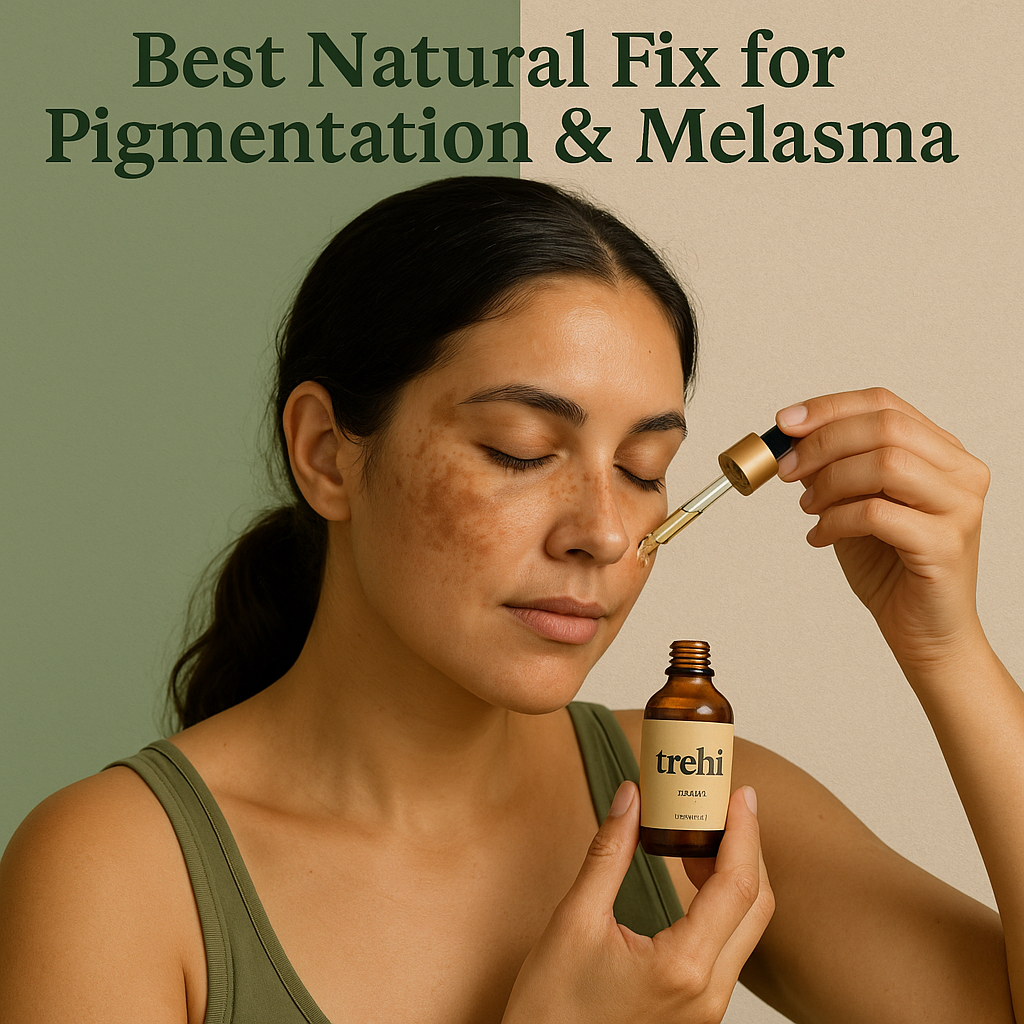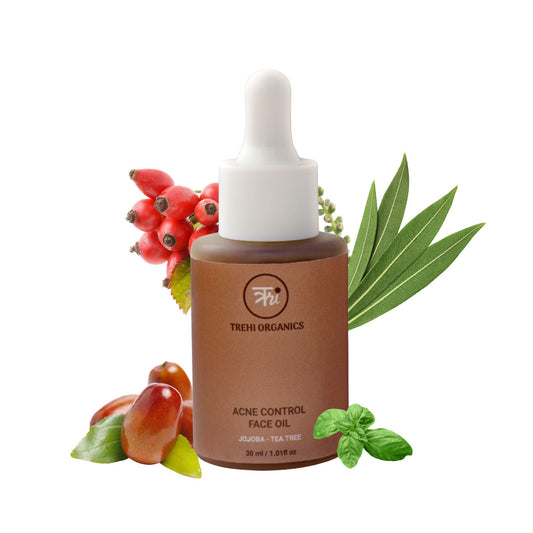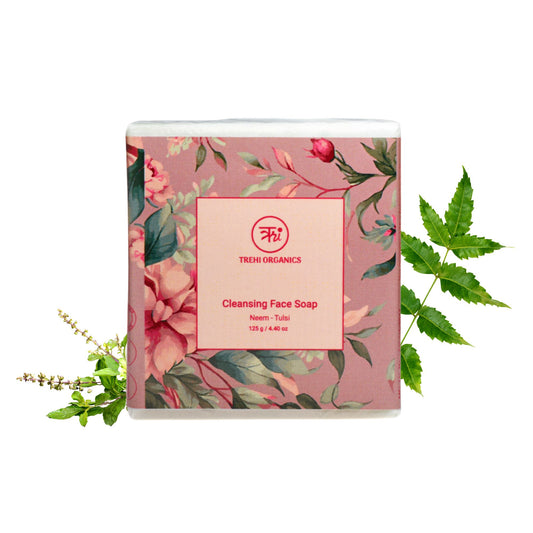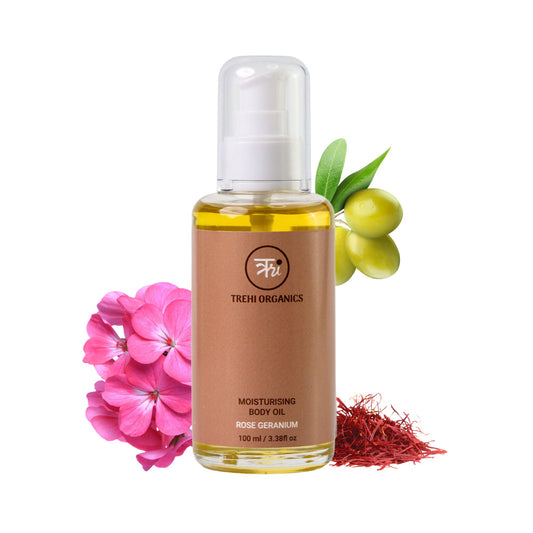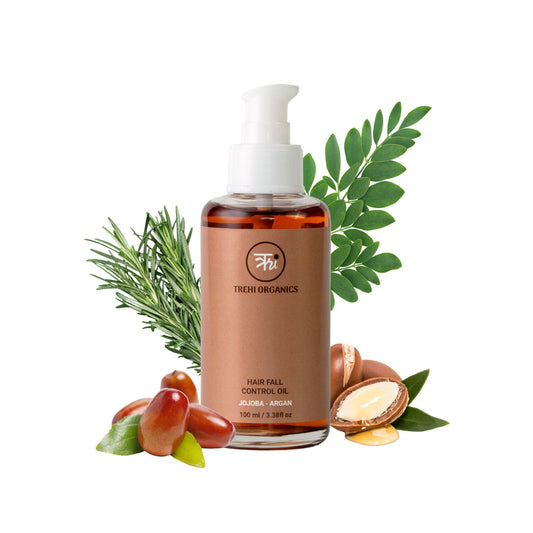Inside our 50,000+ Face Yoga community across India, the UK, and the US, one concern echoes every single day:
“I’ve tried everything for pigmentation. What actually works — and what’s secretly making it worse?”
From brides battling melasma before their big day to new moms and professionals facing stress-triggered spots, thousands are uncovering the real truth hiding in their skincare labels.
This blog unveils the top natural, science-backed ingredients proven to fade pigmentation — and exposes the hidden toxins and “brightening” ingredients that do the exact opposite.
You’ll finally know what to use, what to toss, and how to heal.
You’ll discover:
- The most effective plant-based oils for pigment fading
- Common skincare ingredients that worsen pigmentation
- How to read labels for hormonal health
- And how to amplify results with daily Face Yoga
This guide is for the bride just months away from her wedding, desperate to clear melasma.
For the new mom navigating hormonal chaos.
For the working woman whose screen time and stress are leaving marks on her skin.
And for the thousands in our Trehi community who’ve turned to nature — and finally seen results.
You are not alone. And you are not doing it wrong.
Pigmentation isn’t just a skin concern — it’s an emotional one.
The wrong ingredients trigger melanin overdrive. And even worse? Most “brightening” creams only suppress the symptom, not the cause. When you stop using them, the pigmentation returns — often darker than before.
If you’re stuck in this cycle, this blog is your turning point.
What Are the Best Natural Ingredients to Remove Pigmentation?

The science is clear. Certain natural oils and botanicals do more than soothe—they correct.
Here’s what’s proven to work:
Kesar (Saffron)
Inhibits tyrosinase—the enzyme that triggers melanin production.
Bonus: Adds glow and evens tone.
Studies say Saffron extract significantly reduced hyperpigmentation in controlled trials.
Rosehip Oil
A rich source of retinoic acid (natural Vitamin A)
Fades scars, regenerates damaged skin, and reduces uneven tone.
A 2014 clinical review found Rosehip to significantly improve post-acne pigmentation.
Turmeric (Haldi)
Anti-inflammatory + antioxidant-rich
Breaks up pigment clusters, reduces sunspots, and calms redness.
Did You Know?
Curcumin (active in turmeric) has been found to inhibit melanin synthesis directly.
Licorice Root (Glabridin)
- Naturally blocks melanin production
-
Also reduces redness and post-inflammatory darkening.
Safe for hormonal skin—especially PCOD-prone.
Sweetlime Oil
- A gentle, non-irritating source of Vitamin C
- Brightens without barrier damage, unlike synthetic C derivatives.
Join Our Free Face Yoga Class
Learn how to pair these oils with daily lymph-draining rituals
Boost absorption, reduce facial tension, and see faster, deeper pigment reduction
Which Skincare Ingredients Worsen Pigmentation or Melasma?
Most people don’t realize this…
It’s not just what you use. It’s what you unknowingly tolerate.
Here’s what to avoid at all costs:
Fragrance (Parfum)
Synthetic fragrance = hormone disruptor.
It’s linked to estrogen mimicry and skin sensitization, both of which worsen pigmentation.
Parabens, Phthalates
These aren’t just preservatives—they’re endocrine disruptors.
Found direct links between skincare parabens and hormonal melasma.
Hydroquinone (Long-Term Use)
While it gives quick results, prolonged use leads to ochronosis (irreversible skin darkening).
Trehi never uses it.
Synthetic Vitamin C (Ascorbic Acid)
Often causes rebound pigmentation in Indian skin types.
Why? It’s too harsh on melanin-rich skin, especially when exposed to the sun.
Denatured Alcohol
Strips your barrier, triggers inflammation, triggers melanin
It’s not drying—it’s damaging.
Can Face Oils Really Fade Pigmentation? Which Ones Work Best?
Yes. But not just any oil and not just by applying them randomly.
Oils rich in anti-inflammatory and antioxidant compounds can do what most “serums” can’t:
Heal from within by strengthening your skin barrier, soothing hormonal flare-ups, and reducing oxidative stress.
Best Oils to Fade Pigmentation:
- Kesar Oil – Boosts glow and inhibits melanin overdrive
- Rosehip Oil – Vitamin A-rich for cell regeneration and scar fading
- Sweetlime Oil – Natural, stable vitamin C source (no irritation)
- Turmeric Oil – Fights inflammation + breaks pigment clusters
- Sesame Oil (Base) – Deep absorption + warming carrier that enhances the potency of actives
Use every night. Warm a few drops between palms, inhale the earthy aroma, and press gently into skin.
Pro Tip: Combine with face yoga to stimulate lymph drainage and increase oil absorption.
This duo delivers 2x results—because when your fascia and skin work together, healing happens faster.
Join Our Free Face Yoga Class
Learn oil absorption techniques that boost skin glow, reduce inflammation, and gently drain pigment deposits.
Join Our Free Face Yoga Now
How Do I Know If My Pigmentation Is Hormonal or Product-Related?
Understanding the root cause is key. Here's how to decode your skin’s signals:
Hormonal Pigmentation (Melasma):
- Common during pregnancy, PCOD, thyroid imbalance, or stress
- Appears symmetrically on cheeks, forehead, or upper lip
- Worsens around periods or with emotional stress
- Often linked to internal inflammation + cortisol spikes
Product-Induced Pigmentation:
- Appears suddenly after using a new serum, cream, or peel
- Often itchy, red, or inflamed
- Triggers include: synthetic vitamin C, AHAs, fragrance, alcohols
- Pigment deepens with continued use
Want to know for sure?
Start a product detox for 7 days—switch to cold-pressed oils, no fragrance, and observe your skin.
Many Trehi community members see immediate calming within days.
How to Read Skincare Labels for Pigmentation-Safe Ingredients
Label reading isn’t optional anymore. It’s self-protection.
Avoid These (Red Flags):
-
Fragrance / Parfum
-
Alcohol (denatured / SD alcohol)
-
PEGs / Sulfates / BHT
-
Parabens / Phenoxyethanol
- Any name you can't pronounce or Google safely
Prefer These (Skin Safe):
-
Short, simple ingredient lists
-
Botanicals you recognize (like Rosehip, Turmeric, Sesame)
-
Cold-pressed oils
-
Certified organic label – Not just "natural"
“Skincare label bhi parega India.”
Read every word. If a product needs a chemist to decode it, it doesn’t belong on your skin.
What’s the Best Morning & Night Routine for Pigmented Skin?
Your skincare doesn’t need to be 10 steps.
It needs to be intentional.
AM Routine:
- Gentle Cleanser – Neem-Tulsi Trehi Soap to purify without drying
- Kumkumadi Oil – Just 3 drops, warm in palms, pat into damp skin
- Sunlight, not sunburn – Morning rays, not harsh exposure
PM Routine:
- Face Yoga (15 mins) – Focus on forehead, jaw, and lymph zones
-
Night Glow Oil – Sweetlime-Rosehip formula to heal while you sleep
- Blackout Sleep – Melanin is light-sensitive. Full dark = better repair
- Herbal Tea – Detoxify liver, reduce cortisol
Join the Free Face Yoga Class
Learn the pigment-draining flow your skin needs every night.
Plus: bedtime oil rituals that actually work.
How Long Does It Take to See Results from Natural Ingredients?

Truth bomb: natural doesn’t mean slow. It means lasting.
Healing Timeline (Based on Skin Type & Root Cause):
- Mild pigmentation: 6–8 weeks of consistent use
- Hormonal melasma: 6–9 months (especially if cycle/cortisol is involved)
Key Factors:
-
Daily oiling (AM + PM)
-
Avoiding ALL synthetic toxins
-
Face Yoga → boosts circulation + lymph drainage
- Liver & gut health support = internal balance
“Most people don’t give natural skincare enough time to work. But once it starts—it’s not a temporary glow. It’s real healing.”
Can Diet and Stress Affect Pigmentation Too?
Absolutely. In fact, sometimes the external pigmentation is just a mirror of internal chaos.
How Diet & Hormones Affect Your Skin:
- Cortisol (stress hormone) increases melanin → deeper spots
- Poor liver detox = estrogen dominance = melasma
- Weak gut = poor absorption of healing nutrients
Heal Holistically:
Face Oil +Face Yoga + Nutrient-rich diet = long-term, natural pigment reversal
FAQs About Ingredients for Pigmentation
Q1. Which ingredient is best for pigmentation?
Natural botanicals like Kesar (Saffron), Rosehip oil, Turmeric, Licorice root, and Sweetlime oil are considered highly effective. They reduce melanin production, fade dark spots, and restore an even skin tone without harsh side effects.
Q2. What is the fastest way to remove pigmentation?
The fastest way to reduce pigmentation is a consistent combination of the right natural oils, and face yoga to boost circulation. Ingredients like saffron, rosehip oil, turmeric, and licorice root work quickly when used regularly, while avoiding harsh chemicals like hydroquinone, synthetic vitamin C, and alcohol is equally important. For lasting results, pair topical care with stress management, gut support, and a nutrient-rich diet.
Q3. Can hyperpigmentation go away?
Yes, hyperpigmentation can fade with the right care. Mild pigmentation often improves in 6–8 weeks with natural oils (like saffron, rosehip, and turmeric), a toxin-free skincare routine. Hormonal melasma or long-standing pigmentation may take several months, but with consistency, most cases can improve significantly and stay away when the root cause is addressed.
Q4. What causes skin pigmentation loss?
Pigmentation loss (white patches or lighter spots) happens when melanocytes stop producing melanin. Common causes include autoimmune conditions like vitiligo, post-inflammatory reactions (after burns or injury), nutrient deficiencies, or even harsh chemical treatments that damage pigment cells. Unlike hyperpigmentation, this condition often needs medical evaluation along with supportive natural care.
TL;DR Summary: Natural Pigmentation Reversal Guide
- Top natural oils like saffron, rosehip, turmeric, and sweetlime fade pigmentation safely.
- Avoid hidden toxins: fragrance, parabens, hydroquinone, synthetic vitamin C.
- Face Yoga boosts oil absorption & drains pigment buildup.
- Read skincare labels — your glow depends on it.
- Results: 6–8 weeks for mild cases, longer for hormonal.
- Stress, gut, and liver health all play a role.
- Join our free Face Yoga class for a complete healing ritual.
Ready to heal naturally? [Join our free Face Yoga session now →]
About the Author
I am the author behind Trehi Organics, where I share insights on holistic health, natural remedies, and wellness practices. My goal is to guide readers toward simple and sustainable ways of living that nurture both body and mind.
Learn more about me here: Priyanka Khurana Goyal – Holistic Health & Wellness Coach
